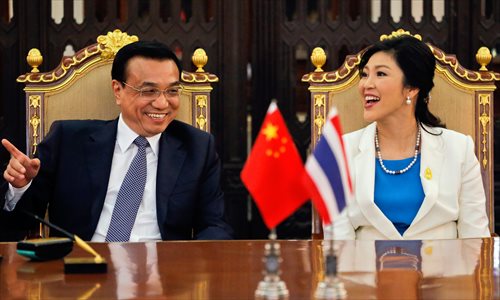HOME >> CHINA
China, Thailand to hold talks on visa exemption
By Agencies – Global Times Source:Global Times Published: 2013-10-12 0:43:00

Chinese Premier Li Keqiang (left) and Thai Prime Minister Yingluck Shinawatra share a light moment during their meeting at the government house in Bangkok on Friday. China is now the largest trading partner of Thailand, with bilateral trade reaching nearly $70 billion last year. Thailand is China's second largest trade partner in the 10-member ASEAN. According to the Bangkok Post, Li and Yingluck promised to propel bilateral trade to $100 billion by 2015. The Chinese premier on Friday gave a speech to Thailand's lawmakers, becoming the first foreign dignitary to address the Thai Parliament in its history. Photo: AFP
Chinese Premier Li Keqiang arrived Friday for an official visit to Thailand, the second leg of his maiden trip to Southeast Asia as premier.
Li delivered a speech at the Thai Parliament shortly after he arrived in Bangkok, in which he said China is ready to hold talks with Thailand over visa exemptions for regular passport holders.
Visa exemption would facilitate people-to-people and cultural exchanges between the two countries, and bring more benefits to the two peoples, Li said.
Thailand is the first country within the Association of Southeast Asian Nations (ASEAN) to start such talks with China.
In an article in Thailand's The Nation newspaper that was published Friday, Li said China will support plans by domestic companies to import 1 million tons of Thai rice in the coming five years.
Li also noted China will seriously consider the establishment of a yuan clearing bank in Thailand to create conditions for Chinese and Thai companies to increase cross-border yuan trade settlement.
Li's trip to Thailand came after he attended a series of meetings between ASEAN and its dialogue partners in Brunei.
During the meetings, the premier called for a South China Sea of "peace, friendship and cooperation."
Also on Friday, China again urged non-parties to the South China Sea dispute to respect the efforts by relevant parties involved to peacefully solve the dispute through direct and friendly negotiations instead of doing things that could harm regional peace and stability.
The South China Sea has been calm and tranquil, so if some countries really want to safeguard peace and stability in the South China Sea, they should stop stirring up waves, Chinese foreign ministry spokeswoman Hua Chunying said.
Her comments came after US Secretary of State John Kerry told the East Asia Summit that all claimants "can engage in arbitration and other means of peaceful negotiation."
Kerry's remarks are seen as support for the US ally the Philippines, which is seeking UN arbitration over the South China Sea dispute.
"Now ASEAN's trade volume with China is double its trade with the US. It is against this backdrop that Washington wanted to use the South China Sea dispute to sow discord between China and ASEAN countries and complicate the issue for its own interests," Ni Feng, a deputy director of the Institute of American Studies at the Chinese Academy of Social Sciences, told the Global Times on Friday.
Wang Min, China's deputy permanent representative to the UN, said Thursday that the settlement of international disputes should strictly abide by the principle of sovereign equality and fully respect the will of states concerned.
Posted in: Diplomacy